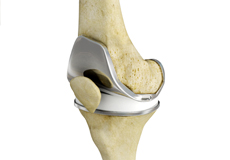
Total Knee Replacement Surgeon in Palm Beach Gardens, FL
A total knee replacement is a surgery to replace diseased or damaged knee joint with an artificial knee joint made of materials, such as metal or plastics. Dr. Robert Avino provides diagnosis and individualized non-operative and operative treatment plans in Palm Beach Gardens, FL. Dr. Robert Avino also provides highly specialized care during and after surgery. Contact Dr. Robert Avino’s office for an appointment today!
What is Total Knee Replacement?

Total knee replacement, also called total knee arthroplasty, is a surgical procedure in which the worn out or damaged surfaces of the knee joint are removed and replaced with an artificial prosthesis.
Knee Arthritis
The knee is made up of the femur (thighbone), tibia (shinbone) and patella (kneecap). The two menisci, the soft cartilage between the femur and tibia, serve as a cushion and help absorb shock during motion. Arthritis (inflammation of the joints), injury or other diseases of the joint can damage this protective layer, causing extreme pain and difficulty in performing daily activities in an arthritic knee, the cartilage itself becomes thinner or completely absent. In addition, the bones become thicker around the edges of the joint and may form bony “spurs”. These factors can cause pain and restrict the range of motion in the joint.
Indications for Total Knee Replacement
Total knee replacement surgery is commonly indicated for severe osteoarthritis of the knee. Osteoarthritis is a type of arthritis. It is the most common form of knee arthritis in which the joint cartilage gradually wears away, and often affects the elderly. Your doctor may advise total knee replacement if you have:
- Severe knee pain that limits your daily activities (such as walking, getting up from a chair or climbing stairs)
- Moderate-to-severe pain that occurs during rest or awakens you at night
- Chronic knee inflammation and swelling that is not relieved with rest or medications
- Failure to obtain pain relief from medications, injections, physical therapy or other conservative treatments
- A bow-legged knee deformity
Total Knee Replacement Procedure
The goal of total knee replacement surgery is to relieve pain and restore the alignment and function of your knee.
- The surgery is performed under spinal or general anesthesia. Your surgeon will make an incision in the skin over the affected knee to expose the knee joint. Then, the damaged portions of the femur bone are cut at appropriate angles using specialized jigs. The femoral component is attached to the end of the femur with or without bone cement.
- Your surgeon then cuts or shaves the damaged area of the tibia (shinbone) and the cartilage. This removes the deformed part of the bone and any bony growths, as well as creates a smooth surface on which the implants can be attached. Next, the tibial component is secured to the end of the bone with bone cement or screws.
- Your surgeon will place a plastic piece called an articular surface between the implants to provide a smooth gliding surface for movement. This plastic insert will support the body’s weight and allow the femur to move over the tibia like the original meniscus cartilage.
- The femur and the tibia with the new components are then put together to form the new knee joint.
- To make sure the patella (kneecap) glides smoothly over the new artificial knee, its rear surface is also prepared to receive a plastic component.
- With all the new components in place, the knee joint is tested through its range of motion. The entire joint is then irrigated and cleaned with a sterile solution. The incision is carefully closed; drains are inserted and a sterile dressing is placed over the incision.
Postoperative Care Following Total Knee Replacement
Rehabilitation begins immediately following the surgery. A physical therapist will teach you specific exercises to strengthen your leg and restore knee movement. Knee immobilizers are used to stabilize the knee. You will be able to walk with crutches or a walker. A continuous passive motion (CPM) machine can be used to move the knee joint. Continuous passive motion is a device attached to the treated leg that constantly moves the joint through a controlled range of motion, while you are at rest. Your physical therapist will also provide you with a home exercise program to strengthen your thigh and calf muscles.
Risks and Complications of Total Knee Replacement
As with any major surgery, the possible risks and complications associated with total knee replacement surgery include:
- Knee stiffness
- Infection
- Blood clots (deep vein thrombosis)
- Nerve and blood vessel damage
- Ligament injuries
- Patella (kneecap) dislocation
- Plastic liner wearing out
- Loosening of the implant
If you would like to have additional information on knee treatments or would like to learn more about total knee replacement, please contact Dr. Robert Avino, serving the communities of Palm Beach Gardens, FL.









